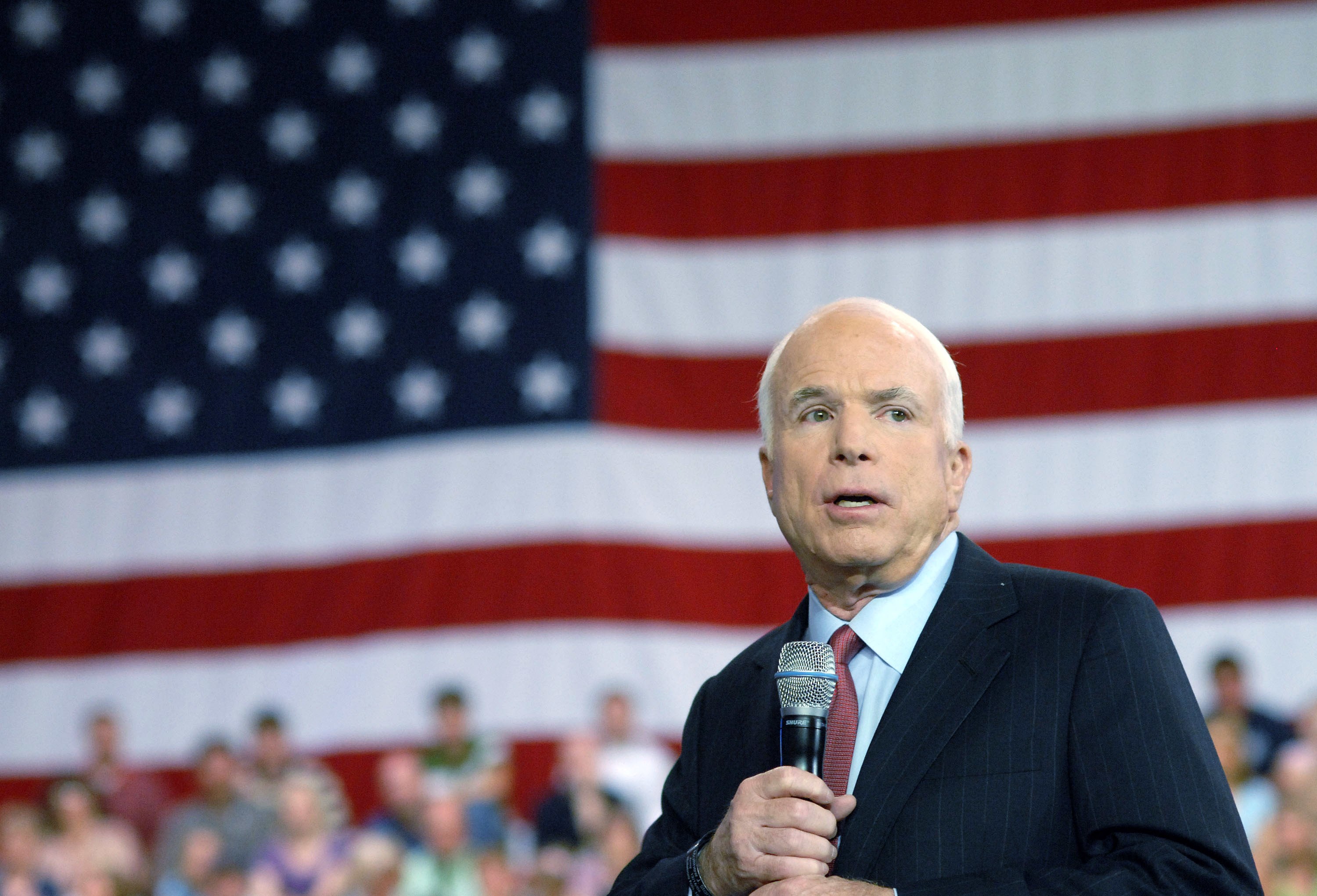John McCain's Legacy of Reaching Across Party Lines Is Something We Should All Remember

Saturday night brought the sad news that Republican senator and Vietnam war hero John McCain died after a battle with brain cancer. “Senator John Sidney McCain III died at 4:28 p.m. on August 25, 2018,” his office said in a statement that evening. It was just on Friday that McCain’s family revealed he was discontinuing treatment for the aggressive form of cancer.
There are no shortage of moments in McCain’s storied career that led him to be affectionately dubbed “The Maverick,” but it’s his lasting legacy as someone who wasn’t afraid to reach across party lines—a nonconformist as his nickname suggests—that his colleagues remarked on the most in his last days. One might not have always agreed with him, but you’d be hard-pressed not to respect him and, in many ways, the principles he chose to live by.
Yes, he is the man who chose Sarah Palin as his running mate in the 2008 presidential election that eventually led to Barack Obama’s first term in office. But he is also the man who staunchly defended Obama when a woman at one of his rallies derided the former President, saying, “I can’t trust Obama. I have read about him, and he’s not, he’s not—he’s an Arab,” both an insult to his opposing candidate and those of Arab descent.
McCain quickly responded with grace: “No ma’am,” he said. “He’s a decent family man, a citizen that I just happen to have disagreements with on fundamental issues, and that’s what this campaign is all about. He is a decent person and a person that you do not have to be scared of as President. If I didn’t think I’d be one heck of a better President I wouldn’t be running, and that’s the point. I admire Sen. Obama and his accomplishments; I will respect him. I want everyone to be respectful, and let’s make sure we are. Because that’s the way politics should be conducted in America.”
During the past two years, McCain became a beacon of light to those, both conservative and liberal, who opposed President Donald Trump. Take for example, in June, when the president seemingly picked fights with a number of American allies at the G7 conference. McCain tweeted: “To our allies: bipartisan majorities of Americans remain pro-free trade, pro-globalization & supportive of alliances based on 70 years of shared values. Americans stand with you, even if our president doesn’t.”
https://twitter.com/SenJohnMcCain/status/1005614491768360960
Trump, himself, famously said in 2015 of the man who spent five-and-a-half years as a POW in Vietnam, “He’s not a war hero. He was a war hero because he was captured. I like people who weren’t captured.”
McCain never shied away from criticizing the president and his administration. He was the lone Republican to vote against Mick Mulvaney, the president’s choice for budget chief. When Trump seemed to equate actions of the United States to those of Russia’s Vladimir Putin, McCain said, “That moral equivalency is a contradiction of everything the United States has ever stood for in the 20th and 21st centuries.”
He also warned that suppressing the press is “how dictators get started.”
Then there was his iconic “thumbs down” during the Senate’s Affordable Care Act vote back in July of 2017. In the days leading up to the vote, it was unclear whether McCain would side with his own party to pass the “skinny” repeal of one of President Obama’s signature pieces of legislation. In the end, he did not.
“I’ve stated time and time again that one of the major failures of Obamacare was that it was rammed through Congress by Democrats on a strict party-line basis without a single Republican vote,” McCain said in a statement after the vote. “We must now return to the correct way of legislating and send the bill back to committee, hold hearings, receive input from both sides of aisle, heed the recommendations of nation’s governors, and produce a bill that finally delivers affordable health care for the American people,” he said. “We must do the hard work our citizens expect of us and deserve.”
He also called for a return to the regular legislative order that would allow proper debate on the issues. “I hope we can again rely on humility, on our need to cooperate, on our dependence on each other to learn how to trust each other again and by so doing better serve the people who elected us,” he said. “Stop listening to the bombastic loudmouths on the radio and television and the Internet. To hell with them. They don’t want anything done for the public good. Our incapacity is their livelihood.”
“Let’s trust each other. Let’s return to regular order. We’ve been spinning our wheels on too many important issues because we keep trying to find a way to win without help from across the aisle. That’s an approach that’s been employed by both sides, mandating legislation from the top down, without any support from the other side, with all the parliamentary maneuvers that requires.”
Of course, McCain was a Republican, and he voted along party lines more than he did not. But in a time when it feels like the country has never been more divided, and even those on the right in Congress who oppose what Trump stands for seem to do so only in tweets, we’d all do well to remember what a maverick truly is—and how one can make change for the better.


